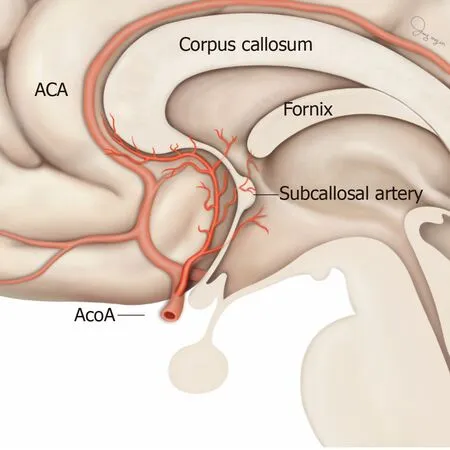Acute amnesia during pregnancy due to bilateral fornix infarction:A case report
2020-04-09MinJaiChoDongIckShinMoonKuHanKyuSunYum
Min Jai Cho,Dong-Ick Shin,Moon-Ku Han,Kyu Sun Yum
Min Jai Cho,Department of Neurosurgery,Chungbuk National University Hospital,Cheongju-si 28644,South Korea
Dong-Ick Shin,Kyu Sun Yum,Department of Neurology,Chungbuk National University Hospital,Cheongju-si 28644,South Korea
Moon-Ku Han,Department of Neurology,Seoul National University Bundang Hospital,Seongnam-si 463-707,South Korea
Abstract BACKGROUND Stroke is an important cause of maternal morbidity and mortality during pregnancy and puerperium.Isolated amnesia is a rare clinical symptom caused by ischemic stroke during pregnancy.We present the first documented case of acute amnesia during pregnancy due to bilateral fornix infarction.CASE SUMMARY A 32-year-old nullipara presented at 35 wk of gestation with acute amnesia and headache.Brain magnetic resonance imaging and angiography revealed acute infarction in the bilateral anterior fornix.There was no evidence of causative abnormality after extensive work-up,including for vascular abnormality,cardiac disease,coagulopathy,and pregnancy-related conditions.The patient was diagnosed with cryptogenic stroke.Aspirin was administered immediately,and the patient recovered fully without recurrence.CONCLUSION Acute isolated amnesia due to stroke is rare during pregnancy.Early diagnosis of stroke and immediate treatment prevent neurologic sequelae.
Key Words:Fornix;Brain;Amnesia;Cerebral infarction;Pregnancy;Stroke;Case report
INTRODUCTION
Cerebrovascular disease during pregnancy is rare,but it is one of the major causes of maternal mortality and serious long-term disability[1].Pregnancy is associated with an increased risk of ischemic stroke(including arterial and venous infarction)and hemorrhagic stroke(including intracerebral and subarachnoid hemorrhage).The incidence of stroke during pregnancy varies depending on gestational age.The greatest risk is observed during the third trimester and early postpartum.Risk factors for cerebrovascular complication during pregnancy are underlying diseases and conditions related to pregnancy[2].Ischemic stroke during pregnancy is less common than hemorrhagic stroke and is higher during puerperium than during pregnancy[2-4].Isolated amnestic syndrome due to vascular disease(especially acute infarction in the bilateral fornix)is a rare situation[5].Herein,we report the first documented case of acute amnesia during the third trimester of pregnancy due to arterial infarction of the bilateral fornix.
CASE PRESENTATION
Chief complaints
A 32-year-old nullipara at 35 wk gestation presented with headache and sudden memory impairment.She could not recall any of the events that happened for 5 d.
History of present illness
Amnesia and headache occurred abruptly.Symptoms did not improve for 5 d.
History of past illness
The patient had no remarkable medical history,including for hypertension,diabetes mellitus,dyslipidemia or migraine.
Physical examination
Upon arrival at the hospital,the patient’s blood pressure was 120/80 mmHg,and her heart rate was 68 bpm and regular.She was alert and oriented to time,person and place.Neurological examination was normal except anterograde and retrograde amnesia.The Mini-Mental State Examination score was 28 and the Montreal Cognitive Assessment score was 26 points with delayed recall impairment.
Laboratory examinations
Laboratory testing was unremarkable,including findings for thrombophilia,autoimmune diseases,diabetes mellitus,dyslipidemia,erythrocyte sedimentation rate,C-reactive protein,thiamine level,and human immunodeficiency virus.
Imaging examinations
Magnetic resonance imaging of the brain revealed acute infarction in the bilateral anterior fornix.No significant steno-occlusive lesions in the intracranial and proximal neck vessels were found in magnetic resonance angiography(Figure 1).
Further diagnostic work-up
Findings from electrocardiography,Holter monitoring,transthoracic echocardiography and transesophageal echocardiography,including a test for patent foramen ovale,were also normal.Findings from obstetric ultrasonography were unremarkable.
FINAL DIAGNOSIS
Cryptogenic infarction of bilateral fornix.
TREATMENT
The patient was immediately treated with 100 mg of aspirin,which was continued until 5 d prior to delivery.
OUTCOME AND FOLLOW-UP
The patient’s symptoms gradually improved.She was discharged to home and completely recovered after 2 wk.She gave birth to a healthy baby by Cesarean section at 4 wk after the stroke.
DISCUSSION
Cerebrovascular disease during pregnancy,especially arterial ischemic stroke,is rare,but it is a critical condition and disabling to the patient[3,6].The risk of ischemic stroke is higher during puerperium than during pregnancy[3].However,hemorrhagic stroke(including intracerebral hemorrhage and subarachnoid hemorrhage)occur more frequently during the second or early third trimesters and in the early postpartum period.Risk factors for cerebrovascular complication during pregnancy are underlying diseases such as prothrombotic conditions,heart disease,anomalies of cerebral vasculature and conditions related to pregnancy,including Cesarean delivery,pregnancy-induced hypertension,peripartum infection,multiple gestation,and the result of hemodynamic and coagulation system changes[2,7].In the case of ischemic stroke,there are many causes of stroke during pregnancy,with common etiologies being hypertension,smoking,diabetes mellitus,dyslipidemia,thrombophilia,paradoxical emboli,heart disease,and anomalies of cerebral vasculature.However,pregnancy-specific causes include preeclampsia/eclampsia,cerebral venous thrombosis,amniotic fluid embolism,posterior reversible encephalopathy syndrome,peripartum infection,Cesarean delivery,postpartum cerebral angiopathy,and gestational trophoblastic disease[2,8].The management of stroke during pregnancy is guided by the stroke etiology and subtype.In the case of arterial stroke,early antiplatelet agent therapy(i.e.,aspirin)is recommended for cases without intracranial bleeding and as secondary prevention.In the case of symptomatic cerebral venous sinus thrombosis,with or without hemorrhagic venous infarction,anticoagulation should be continued throughout the pregnancy[9,10].
Several cases of memory impairment during pregnancy due to cerebral dysfunction have been reported previously.Wernicke encephalopathy is a clinical syndrome characterized by acute amnesia following hyperemesis gravidarum.This typically occurs at 14-16 wk of gestation and is caused by thiamine deficiency[11].Sudden onset of amnesia due to a vascular lesion in a healthy young woman is an uncommon situation.Acute amnestic syndrome due to infarction of bilateral fornix,an important anatomical structure of the Papez circuit,is a rare condition and only a few cases have been reported.Small vessel disease,cardioembolic disease and giant cell arteritis have been proposed as the etiology.The subcallosal artery,a perforator of anterior communicating artery,supply the bilateral column of fornix(Figure 2).Iatrogenic subcallosal artery occlusion after clipping or surgery of the anterior communicating artery can also cause acute amnestic syndrome.However,the patients in the previous reports[5,11-15]did not represent young-age pregnancies without risk factors of ischemic stroke or cerebral vascular abnormality.

Figure 2 Vascular supply of the fornix.The vascular supply of the column of fornix is the subcallosal artery which is a small perforating branch arising from the anterior communicating artery.ACA:Anterior cerebral artery;AcoA:Anterior communicating artery.
Our patient was diagnosed with an acute infarction of the bilateral fornix during the third trimester of pregnancy.She had no conventional risk factors of ischemic stroke.Extensive diagnostic workup for ischemic stroke,including cardioembolism,paradoxical emboli,autoimmune disease and coagulation disorder,were performed and there were no remarkable findings.Patent foramen ovale is an important cause of cryptogenic stroke in healthy young adults,especially during pregnancy.However,transesophageal echocardiogram showed no evidence of patent foramen ovale.There was no evidence of pregnancy-related risk factors such as gestational hypertension,preeclampsia/eclampsia and coagulopathy.Brain magnetic resonance imaging and magnetic resonance angiography revealed acute infarction in the bilateral fornix without significant steno-occlusive lesion of the anterior communicating artery.We diagnosed the patient with cryptogenic stroke,and aspirin was administered immediately.The amnesia was completely resolved.There was no recurrence at the 1-year follow-up.
This case is the first report of acute amnesia due to infarction of the bilateral fornix during pregnancy.Bilateral fornix infarction is a very rare situation during pregnancy.Brain imaging should be considered for acute onset amnesia,especially if symptoms persist more than 24 h.Early detection of stroke and immediate treatment are important for good recovery.
CONCLUSION
Acute isolated amnesia due to cerebral infarction during a healthy young pregnancy is extremely rare.All previously documented cases of pure amnestic syndrome due to bilateral fornix infarction found a presumed pathophysiology including microangiopathy,cardioembolism,vasculitis and iatrogenic injury after aneurysmal procedure of the relevant artery.Early diagnosis and immediate treatment are important for good recovery in cryptogenic stroke.
ACKNOWLEDGEMENTS
The authors are grateful to the patient and her parents for allowing publication of this rare case report.
杂志排行
World Journal of Clinical Cases的其它文章
- Role of monoclonal antibody drugs in the treatment of COVID-19
- Review of simulation model for education of point-of-care ultrasound using easy-to-make tools
- Liver injury in COVID-19:A minireview
- Transanal minimally invasive surgery vs endoscopic mucosal resection for rectal benign tumors and rectal carcinoids:A retrospective analysis
- Impact of mTOR gene polymorphisms and gene-tea interaction on susceptibility to tuberculosis
- Establishment and validation of a nomogram to predict the risk of ovarian metastasis in gastric cancer:Based on a large cohort
